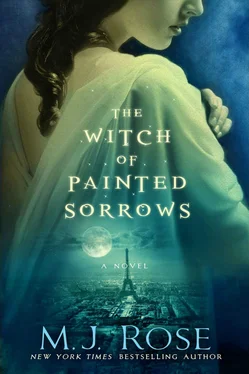Saying nothing, he reached out and slapped Leon.
Leon accepted the blow. His head fell forward. He began to gasp for air. Within moments he dropped to his knees on the stone cold steps as he desperately tried to breathe. And then Leon fell, still gasping, onto his side.
I screamed and ran forward, but my grandmother stopped me from going to him. She held me in her arms, held me as if just holding me was going to make everything all right, but it didn’t.
The professor raced inside—to get his son’s medicine, as it turned out—but by the time he returned minutes later, there was nothing he could do.
Leon died of an asthma attack in his father’s arms. He died while I stood there, helpless, watching in horror.
I don’t remember what I did after that, but I’ve been told I was ill for days: burning up with a fever and delirious. All I could think was that if Leon hadn’t been with me, if we hadn’t sneaked off, he would never have died. It was my fault. It was because of my passion, my hunger, my joy of being with him, of wanting more of him touching my breasts and whispering behind my ear . . . It was my fault for wanting to feel his lips bruising mine, for wanting to taste his sweet mouth . . . for craving the sensations building inside of me that I’d never felt before and that were so glorious . . . feelings I couldn’t get enough of. It was my fault because I wanted his fingers teasing me . . . touching me where he shouldn’t . . . making my heart quicken . . . making magic. It was my fault for not wanting to be a girl anymore but to come to life as a woman as I lay under him. It was that desire in me, those needs, that killed the first boy I’d ever kissed . . . those cravings that were responsible for the first man I’d ever loved dying.
I vowed never to allow myself those feelings again. There was no good to come of them. In my delirium I saw myself as a succubus, one of those demon women I’d read about in the mythology books my father gave me. Evil beings I’d had nightmares about.
Now, ten years later, there I was, naked in Leon’s mother’s boudoir, and she was pulling a silken chemise over the same skin that her son had pressed his lips to.
How had her husband been able to abide bringing me into their home? How could they not hate me? How could Leon’s mother and father show me such kindness?
“There,” she said as she buttoned a dress up in the back. The fabric smelled of a fine, expensive perfume, and I felt cosseted and safer here than I had felt in weeks.
“Madame Ferre, can you tell me where my grandmother is? Why is the house dark? Why are the servants all gone? She never travels this time of year. Is she . . .” I was afraid to even say the words out loud. “Is she all right?” My voice broke as I asked.
My father was dead. I’d left my husband. And if Grand-mère was gone . . .
“She’s fine, Sandrine,” Madame Ferre said. “Your grandmother is planning a renovation. She’s taken an apartment not far from here so she can supervise the work. Come, finish getting dressed, and I’ll get you something to eat, and then we’ll take you to her.”
“There’s no need to do that, Bridgitte.” I recognized the rich honey-toned voice and spun around.
There was my grandmother in all of her glory. Blazing orange hair, fire opals at her ears and around her throat. A burnt-orange silk dress with black lace trim swirling around her.
I expected her to greet me the same way she used to when she visited me in New York, with open arms and joy, but the woman standing in the doorway was frowning.
“Sandrine, didn’t I tell you never to come back to Paris? This city is poison for you.” Her voice was tense and tight. “Why didn’t you listen?”
And in those last four words I heard something I’d never heard in her voice before—fear.
Professor Ferre carried my luggage. It was peculiar leaving the one mansion and not going next door to the other. The farther we walked away from my grandmother’s house, the more I found myself longing to go back. As if there were a magnetic force pulling me.
It must be that it was my father’s house, I thought. Because it was where he grew up, I wanted to stay there and be close to my memories of him.
Our destination was only a few blocks away, on rue de la Chaise. Inside the porte cochère was a smaller courtyard, where a classic six-story apartment building stood, its four stone steps leading up to wooden double doors ornately carved with garlands of flowers and fruits.
“But why are you living here? What’s wrong with your house?” I asked my grandmother.
“I have rented three floors here. The public rooms on this floor, bedrooms upstairs and servants’ quarters on the top,” Grand-mère said as she ushered me in and then turned and thanked the professor for helping with my luggage.
Indeed, at first glance the apartment was beautiful. There were gilded egg-and-dart moldings on the door, an elegant parquet floor, and tall ceilings. The parlor was filled with items I recognized from the mansion, but instead of these knickknacks making the suite of rooms more familiar, they only heightened the displacement I felt.
“But why are you here instead of Maison de la Lune?”
“All in time,” my grandmother said with a smile on her face but a harshness in her voice. “First we need to discuss why you are here.”
From the windows I could see a view of a charming garden, but it was not the same one where Leon and I had sat and fed the pigeons and stolen kisses when dusk fell, the shadows lengthening and dark enough to hide us. And there was no bell tower attached to the back of this building like the abandoned sixteenth-century leftover that rose out of the back of La Lune like a mystical shrine to the past. I was never allowed inside, but my bedroom in La Lune had faced the stone tower, and I used to make up stories about the princess walled up inside who was waiting to be freed. Sometimes at night, I thought I heard the ancient bells ringing softly, whispering to the stars, even though my grandmother told me the bells were long rusted and ruined.
“We’ll have chocolat chaud, Alice,” my grandmother told her maid, who’d come to help us get settled.
“Isn’t Bernadette still with you?” I asked.
“No, she married a widower who owns a restaurant in Marseille. I get letters from her all the time. She’s doing well and has two little girls.” Grand-mère smiled. “She lets them draw on the envelopes.”
All of my grandmother’s servants stayed in touch with her. She was more than fair to them, and they never forgot her. My grandmother may have been a sensualist and a businesswoman, but it was her streak of kindness and her genuine interest in people that endeared her to her friends, those in her employ, and the men she entertained.
When I’d lived with her and commented on how the help seemed so much more informal with her that ours was with us in New York, she admonished me for having haut monde mores and being a snob.
“I have more in common with them than with your mother, mon ange ,” she told me. “After all, I’m not a fancy married lady, but just another working girl, toiling every day for my bread and milk.” And then she’d laugh. That throaty laugh—like her dramatic maquillage, unusual jewels, and voluptuous clothes—had always made her seem so exotic to me and did still. My grandmother inspired awe. She was like a rare jungle orchid.
My mother, on the other hand, was more like a bouquet of pretty pale pink roses in a Renoir still life. She wasn’t interested in the things my father and I were. She didn’t like to visit museums or talk about architecture or literature or esoteric philosophies. She preferred gossip to going to the opera or ballet, a visit with the dressmaker to a visit to the museum, an afternoon tea with the ladies to a spirited discussion about a recent gothic novel.
Читать дальше


![Лаура Бренз - Потомственная ведьма[Inherit the Witch]](/books/79609/laura-brenz-potomstvennaya-vedma-inherit-the-witch-thumb.webp)









